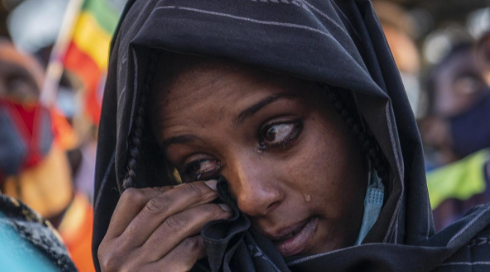As war inches closer, life continues almost as normal on the traffic-clogged streets of Ethiopia’s capital. Bars and restaurants are doing a brisk trade. Bored commuters still queue for tightly-crammed buses on their way to work. But dread and defiance bubble just beneath the surface.
Rebels from the northern Tigray region have captured a string of strategic towns on the main road leading to Addis Ababa in recent days and claim they are poised to march on the city of five million people.
They also say they have formed an alliance with eight other militant groups. The organisation leading them, the Tigray People’s Liberation Front (TPLF), dominated Ethiopia’s politics until it lost power after 27 years in 2018. Few Addis residents are keen to see the front return.
On the corner of a cobbled street, as he walks to work, Tariku Ashenafi points to a series of scars etched across his forehead. “They did this to me when they were in power,” he says. “I was beaten for protesting against them, so if they come here, I will fight until death.”
At the coffee stand under a tarpaulin that he runs outside his home, Yared Asrat also worries about the advance. “We are scared of the TPLF,” he says, sitting with his young child on his lap. “When they were in power, they took everything, there was no freedom. If they come back, they will kill people.”
The city’s large expat community is unsettled. After the US embassy urged its citizens to leave this week, some aid groups started sending home non-essential staff. A group of European exchange students say they have booked flights home after a flurry of WhatsApp messages from parents.
In the cafés and bars there is more scepticism. “We hear on social media that Addis is being surrounded, but it is not true,” says Aleligne Ferede, an estate agent.
“I’ve called colleagues outside Addis and they say there is no war there.”
Yet he would take up arms if necessary, he adds. “I’m ready to sacrifice myself for my country and my family. Whenever the government orders me, I will go and fight.”
Many residents dismiss news of the rebel advance as propaganda spread by forces bent on the destruction of Ethiopia. The government regularly condemns western coverage of the war against the rebels, which has dragged on for a year. A recent retort began: “There is no country that will crumble by white propaganda! The war we are in is a war of survival!”
On Tuesday prime minister Abiy Ahmed’s cabinet imposed a state of emergency that suspended civil liberties and gave the police powers to detain anyone accused of aiding the rebels. A day later Abiy called on citizens to join the army and urged them to bury the country’s enemies “with our blood and bones.”
Raids are being carried out on private homes. A lawyer tracking recent arrests says thousands of Tigrayans in Addis have been detained since the new measures came into force, while there is constant talk of “Tigrayan spies” in the capital feeding information and funds to the rebels. Long lines of cars queue at checkpoints in the city as police search vehicles. Tigrayan residents say they are not leaving their homes.
Officials have ordered residents to organise in defence of their neighbourhoods and to register privately-owned firearms to the city administration. A sizable chunk of the population appears to have listened. At one police station a steady stream of people arrive carrying handguns of various sizes in plastic shopping bags or with ancient hunting rifles slung over their shoulders.
For many the economy poses a more urgent threat than the TPLF. Because of a foreign currency crunch and spiralling inflation many people who had stable jobs are struggling to feed their families. Men looking for work loiter on the sides of roads.
“I’m living in the street, I have no work, so if they come here, I don’t care,” says Addisu, 30, an unemployed labourer who scrapes a living by collecting plastic bottles, discarded shoes and other rubbish. “Things can’t get any worse.”
It is not clear whether the Tigray rebels really do plan to take Addis. No one is sure if they are capable of doing so after heavy fighting against federal forces and their allied militias, with reports of large arms shipments arriving at Addis Ababa’s airport to replenish the federal arsenal. But few want to find out.
“It is unthinkable,” says Girma Tilahun, a worker at a car wash, contemplating the bloodbath that could ensue. “If war comes here, I will be ready to fight.”








































admin in: How the Muslim Brotherhood betrayed Saudi Arabia?
Great article with insight ...
https://www.viagrapascherfr.com/achat-sildenafil-pfizer-tarif/ in: Cross-region cooperation between anti-terrorism agencies needed
Hello there, just became aware of your blog through Google, and found ...